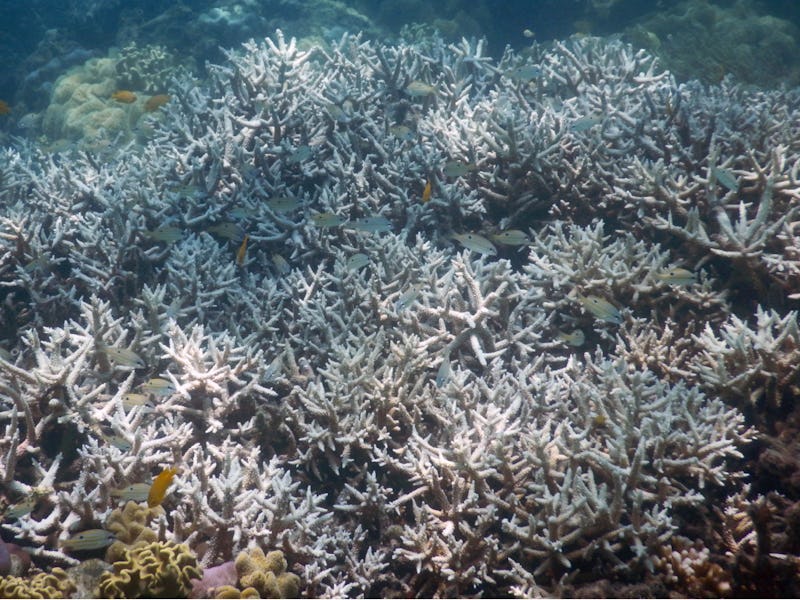The Great Barrier Reef Might Really Be Screwed This Time
A new study shows just how dire the situation is.

Scientists revealed today that Australia’s Great Barrier Reef is doing worse than we previously thought. Overfishing and pollution pose significant threats to coral reef habitats, but these dangers pale in comparison to rising ocean temperatures. Tropical reefs thrive in warm waters, but when ocean temperatures rise faster than corals can handle, the result is bleaching events that kill reef-building organisms.
In October 2016, news outlets reported that the Great Barrier Reef was dead. This sensational story turned out to be a publicity stunt intended to draw attention to the reef’s perilous situation, but now it turns out the iconic ecosystem really might be closer to death than ever before.
Three mass bleaching events have affected the Great Barrier Reef since scientists first documented such events in the 1980s: in 1998, 2002, and 2016. This latest bleaching event, according to a paper published today in the journal Nature by a group of Australian scientists, has left the Great Barrier Reef more than 60 percent dead.
“We didn’t expect to see this level of destruction to the Great Barrier Reef for another 30 years,” Terry Hughes, the paper’s first author, tells the New York Times. “In the north, I saw hundreds of reefs — literally two-thirds of the reefs were dying and are now dead.”
Hughes emphasizes that, for the Great Barrier Reef, climate change is not a future threat. It’s been happening for years, and this most recent study confirms just how bad things are.
To conduct this research, scientists conducted aerial surveys of 1,156 reefs in the Great Barrier Reef Marine Park and Torres Strait between March 22, 2016 and April 17, 2016, rating areas based on what percentage of each reef was bleached. They then confirmed the results of these surveys with underwater assessments.
This slow-growing Porites coral colony is one that bleaching has hit particularly hard. Slow-growers like this will have a harder time recovering under rising sea temperatures.
Though the researchers found that huge swaths of Great Barrier Reef have experienced bleaching, they did find that some species of corals are particularly resistant to bleaching, and some are quicker to recover from bleaching. Even the more resilient corals, though, are in danger from bleaching events. The paper’s authors write that while even the fast-growing corals could take 10-15 years to recover, the longer-lived corals could take many decades to recover — assuming ocean temperatures don’t keep rising.
“Recovery for long-lived species requires the sustained absence of another severe bleaching event (or other significant disturbance), which is no longer realistic while global temperatures continue to rise,” write the authors. “Therefore, the assemblage structure of corals is now likely to be permanently shifted at severely bleached locations in the northern Great Barrier Reef.”
In short, the Great Barrier Reef, one of the most iconic ocean ecosystems in the world, will dramatically change in appearance and function within our lifetime.
Abstract: During 2015–2016, record temperatures triggered a pan-tropical episode of coral bleaching, the third global-scale event since mass bleaching was first documented in the 1980s. Here we examine how and why the severity of recurrent major bleaching events has varied at multiple scales, using aerial and underwater surveys of Australian reefs combined with satellite-derived sea surface temperatures. The distinctive geographic footprints of recurrent bleaching on the Great Barrier Reef in 1998, 2002 and 2016 were determined by the spatial pattern of sea temperatures in each year. Water quality and fishing pressure had minimal effect on the unprecedented bleaching in 2016, suggesting that local protection of reefs affords little or no resistance to extreme heat. Similarly, past exposure to bleaching in 1998 and 2002 did not lessen the severity of bleaching in 2016. Consequently, immediate global action to curb future warming is essential to secure a future for coral reefs.